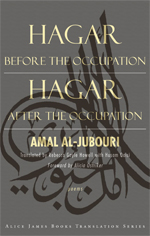
|
Amal al-Jubouri’s most recently translated work, Hagar Before the Occupation / Hagar After the Occupation, contains poems that reflect a life changed by the control of a regime. In these poems, translated by Rebecca Gayle Howell with Husam Qaisi, the simple things we do every day that we take for granted are upended and forever changed. One poem is juxtaposed against another, revealing this change, drastic and full of sorrow, echoed in the first line of the last poem in the collection, “Poetry After the Occupation”: “Weighted with shame, you became / too weak to hold my grief.” Poetry, the art form most used during times of political and emotional turmoil, can barely heal or hold the events of this life. But al-Jubouri allows poetry, whatever its weaknesses, to share the story of this changed life. The collection begins with how the speaker’s family has changed, and one of the most poignant pairings in this section is “My Daughter Before the Occupation / My Daughter After the Occupation.” In the Before poem, the daughter is full of questions about the mother’s choices: about why the family lives in Iraq, about her mother’s political abandonment of her country. However, in the After poem, the daughter stops asking questions, “knows no one but her grandmother / … And that’s all she wants to know.” The occupation has halted the daughter’s sense of identity. In comparison, “My Soul Before the Occupation / My Soul After the Occupation” finds the mother silenced as well. In the Before poem, the speaker has been “buried alive” and carries “the savior in a barren womb.” In this poem, there is some hope of the soul being born again, no matter what the source. In the After poem, however, the soul escapes and the speaker hides “(her) exhaustion, (her) yellowing blood” from her family, unwilling to let them see what this change has done to her. What of the men? al-Jubouri leaves no one out. In “Men Before the Occupation / Men After the Occupation,” as well as “My Husband Before / After,” the men are “gigolos farmers,” the husband stumbles “between fear and fire,” his name “my tattoo of pain.” And after? Happiness cannot be risked; anyone “who had both love and breath” would be in danger of losing their lives. “Who are the real men? No one knows.” Our poet reaches deeper, into the body, the grave, into the freedom that gives us the power to make us choices, though, when squandered, changes the way we live. However, sometimes the lack of freedom gives us cause to speak out, as we see in “My Mouth Before / After the Occupation.” In the Before poem, the first two lines read: “tried to say no, but couldn’t / I was afraid.” In the After poem, the first two lines, in contrast: “shouts No! Fearless / though my tongue fears arrest.” al-Jubouri even moves to a national pastime, soccer, and explores how it changes under the occupation. In the Before poem: “We were scared to cheer / but terrified we might lose”; and in the After poem: “One voice— / we cheer and cheer and cheer.” The final pairing, “Poetry Before the Occupation / Poetry After the Occupation,” is a testament to the power and weakness of poetry. In the before poem, the speaker states: Before the womb expelled me I was your creation But what happens when poetry can’t heal us or give us strength? You gathered me into your mouth, You plastered my fractured soul until all I knew to do Poetry shatters and all that is left is “This prose / This regret” (“Poetry After the Occupation”). It is no longer a set form or stanza, but a fragment of its history. It no longer speaks for the beliefs of a nation, but for those of the individual. Poetry changes to meet the needs of the people, is changed by the poet so she can share her world across oceans and continents, changes languages so we can read these truths in their necessary forms. --Julie Brooks Barbour |
